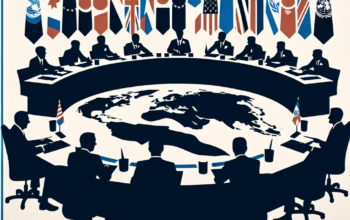The Legacy of Political Scandals: Lessons Learned
Political scandals have shaped the landscape of governance, impacting public trust, policy-making, and even the fundamental operation of democratic institutions. As we stand in 2025, reflecting on historical and recent political scandals offers valuable insights into their lasting legacy and the lessons learned that can influence future governance. These events often reveal the frailties of political systems, the dynamics of power, and the importance of accountability. In this article, we will explore the enduring consequences of political scandals and the key lessons that can be gleaned from these often tumultuous episodes in political history.
The Historical Context of Political Scandals
Political scandals are not a modern phenomenon; they have existed throughout history, from the fall of Julius Caesar to the Watergate scandal in the United States. An understanding of their historical context is essential, as it illustrates a recurring theme: power often breeds corruption. By examining past incidents, we see patterns in behavior among political leaders who exploit their positions for personal gain. The legacy of these actions has often led to significant reforms, highlighting the critical need for transparency and accountability in governance.
One of the most notable historical political scandals was the Iran-Contra Affair during the Reagan administration, where senior officials secretly facilitated the sale of arms to Iran, ostensibly to secure the release of hostages while using the profits to fund Contra rebels in Nicaragua. This event not only highlighted failures in government oversight but also sparked debates about presidential power and the limits of executive authority. The lessons learned from such events have paved the way for constitutional reforms and a more vigilant approach to preventing similar follies in the future.
Modern Scandals: A Review of Recent Events
Moving into the modern political arena, scandals continue to emerge with alarming frequency, reflecting evolving social norms and the instantaneous nature of scrutiny in the digital age. Issues such as the Cambridge Analytica scandal, which involved the unauthorized harvesting of personal data by political campaigns, exposed not only ethical breaches but also raised pertinent questions about privacy and data protection legislation worldwide. The implications of such actions resonate strongly in the digital era, where data ethics and political engagement through social media play critical roles in shaping public opinion.
The COVID-19 pandemic also unveiled several political scandals, primarily concerning government responses and alleged mismanagement. For instance, in countries like the UK and the United States, a number of politicians faced allegations of corruption related to the distribution of contracts for personal protective equipment (PPE). These incidents serve as reminders that crises can amplify existing issues within political systems, revealing both negligence and the need for robust regulatory frameworks to enforce ethical governance during times of national stress.
The Impact of Scandals on Public Trust and Engagement
The relationship between political scandals and public trust is complex. While scandals can initially erode trust in institutions, they can also serve as catalysts for citizen engagement and political activism. When political leaders fail to uphold their responsibilities, citizens are often prompted to demand accountability. The rise of grassroots movements and advocacy for reforms can be traced back to public outrage generated by scandals, leading to changes in law, public policy, and even the way future politicians conduct themselves.
Moreover, as the political climate in 2025 shows, we live in a time where younger generations have little tolerance for scandal-prone politicians. Through platforms such as TikTok and Instagram, younger voters are increasingly influential, demanding greater transparency and ethical behavior from their leaders. This shift emphasizes the importance of adaptability in political strategies, as candidates are held to account under the watchful eyes of a more informed and engaged electorate. Scandals have thus reinforced the idea that the electorate plays a critical role in maintaining the integrity of political institutions.
Reform and Accountability: The Lessons Forward
In the wake of political scandals, the need for accountability and reform becomes increasingly clear. As we delve into the complexities of governance in 2025, it is evident that legislative measures aimed at ensuring ethical conduct among public officials are crucial. Mechanisms such as independent ethics committees, transparency initiatives, and whistleblower protections are vital for preventing future scandals. Legislative bodies around the world are now more focused on creating laws that govern conflict of interest, lobbying practices, and campaign finance, thereby reinforcing the integrity of political offices.
International organizations and non-governmental organizations have also played a pivotal role in promoting accountability. Initiatives focused on anti-corruption, such as the Extractive Industries Transparency Initiative (EITI), have emerged, encouraging governments to demonstrate accountability in resource management. The globalization of these efforts fosters a culture of responsibility and governance ethics that transcends borders, ensuring that accountability is not only a local issue but a global imperative.
Furthermore, education plays an essential role in building a culture of accountability within political systems. In 2025, civic education programs that emphasize the history of political scandals and the importance of active citizenship have been integrated into many educational curricula. By fostering a generation that understands the implications of political misconduct, societies can cultivate informed citizens who will hold their leaders accountable. These educational initiatives aim to empower people to engage critically with political narratives, thus strengthening democratic institutions.
Political Scandals as a Catalyst for Ethical Reformation
Ultimately, the legacy of political scandals can be viewed through the lens of ethical reformation. Each scandal, however damaging it may appear initially, lays bare the vulnerabilities within the political system and encourages society to re-evaluate the ethical standards expected of public officials. In 2025, many countries are experiencing unprecedented levels of scrutiny regarding how politicians conduct themselves, demonstrating a growing demand for ethical governance that transcends traditional practices.
Scandals like the recent bribery allegations involving high-ranking officials in various nations indicate that unethical behavior is not only being uncovered but is also being challenged. The wider societal discourse surrounding these issues fosters a collective demand for integrity within political structures. This climate of expectation places pressure on political leaders to not only avoid scandalous behavior but to actively promote ethical practices within their administrations.
In summary, while political scandals often elicit frustration and disappointment, they also provide an opportunity for significant cultural and institutional change. The lessons learned from these events resonate through generations, informing both public expectations and the behavior of politicians. In the face of political scandals, societies have the power to shape a future informed by integrity, transparency, and a commitment to accountable leadership.
Conclusion
Reflecting on the legacy of political scandals reveals a rich tapestry of lessons learned that continue to influence governance worldwide. From historical scandals that have shaped legal frameworks to modern crises that engage citizens in newfound activism, the ongoing dialogue about ethics and accountability remains crucial. As we navigate through 2025 and beyond, it is clear that the journey towards establishing a politically accountable society is ongoing. Embracing the lessons from past scandals will be integral for future progress, encouraging new generations to advocate for transparency and uphold the values of democracy.
FAQs
What are some examples of major political scandals in history?
Some notable historical scandals include the Watergate scandal in the United States, the Iran-Contra Affair, and the Levée de l’immunité incident in France. Each of these scandals has significantly impacted political systems and public trust.
How do political scandals affect public trust in government?
Political scandals often lead to decreased public trust in government officials and institutions. However, they can also drive citizens to become more engaged and demand accountability, ultimately fostering a more active participation in governance.
What measures can be taken to prevent political scandals?
Preventative measures may include implementing strict transparency laws, establishing independent ethics committees, fostering a culture of accountability, and educating citizens about political ethics. These measures aim to create a robust political environment where unethical behavior is reduced.












